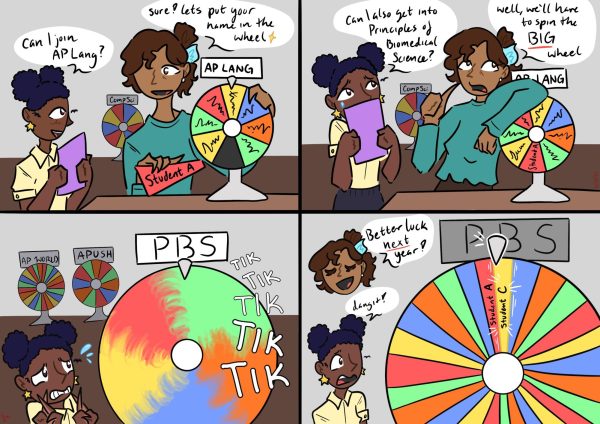UC schools should not require two years of foreign language
Opinion columns reflect the view of the staff writer.
The original version of this column that appeared in the March issue of The Californian indicated the incorrect information that the San Ramon Valley Unified School District required two years of a foreign language to graduate. The updated version of this column includes the correct information.
As we head into the last stretch of the school year, many underclassmen and incoming freshmen have been thinking of classes to enroll in for the next school year.
But many students will be disappointed to see that their choices are fairly limited because of the college requirements for foreign language, more specifically the University of California requirements.
World language is a two-year requirement for UC schools with a third year as a recommendation. Applicants to these universities have to fulfill these requirements in order to be considered for a spot at these universities. With college applications becoming competitive each year, many students just choose to abide by these requirements. But this harsh requirement should be reduced to one year for a multitude of reasons.
First and foremost, taking two to three years of required world language gets in the way of enrolling in classes students might have an interest in. With many requirements in core subjects such as English, math, and science, students have very limited space in their schedules to fit classes they might want to enroll in out of pure interest or passion.
Why force students to sit through another year of world language when we can allow them to take classes in a wide array of fields that are offered at Cal High? Just to name a few categories, Cal High offers classes in fields such as computer science, engineering, medicine, art, business, and psychology.
With two years of required world language, and a third recommended (which most students just interpret as “just take another year, or you won’t get into college”), world language takes up a lot of prime real estate on one’s schedule.
Since most students who take world languages usually enroll in it in their freshman, sophomore, and sometimes even junior year, students have to postpone their interests toward the ending years of high school.
But if the UCs were to cut down the world language requirement to one year, students could take a variety of courses without having to worry about running out of time in high school to explore their interests before they head off to college.
Additionally, learning a foreign language in the U.S. simply doesn’t have as much value as a foreigner trying to learn English. While being bilingual in America might open up a few doors, it isn’t a crucial requirement that employers are looking for that will be the ultimate deciding factor for a job offer.
Even if students want to achieve mastery in a world language, doing it through required high school courses isn’t the way to go. Simply put, gaining proficiency in a world language through a typical classroom setting rarely achieves proficient speakers.
According to the Linguistic Society of America, most bilingual speakers gain proficiency in a language during their childhood. This is because of the exposure they get from everyday conversations with parents and family members who speak the language, which acts as a consistent practice to achieve proficiency.
This same environment simply cannot be replicated in a classroom setting. With the focus being more on “requirements” such as tests, assignments, and homework, most already disinterested students become even more disinterested in learning.
Only 21.6 percent of the U.S. population is bilingual according to data from the American Community Survey, which is conducted by the Census Bureau. Most of them are heritage speakers. It simply doesn’t make sense to invest in world language and spend two to three years of a student’s life to only achieve a minuscule fraction of proficient speakers.
While there might be people who have an interest in world language, making it a requirement precludes the one student who might have an interest in engineering and business but cannot take the class because of the world language requirements.
Therefore, having a two-year world language college requirement should be reduced since it limits the choices of courses students can enroll in, doesn’t have a significant impact on one’s career here in the U.S., and is simply a waste of time and resources that could otherwise be spent elsewhere.

Senior Abhinav Purohit is back for year three as the Social Media & Video Production Editor for The Californian. This year he hopes to strengthen the...


Sebastian • Jan 29, 2024 at 9:49 am
I agree with everything here. When one says yes to one thing in their schedule, they’re saying no to another thing. If I’m forced to take a language in school, then I can’t take computer programming or graphic arts because of what I can and can’t fit into my schedule. There are benefits to taking a language, but the resources (time, money and energy) can also be spent somewhere else. 🙂
Language other than English must start earlier, like TK, K or Grade 1 so that students will have the ability to explore their hobbies and interests later in life.
If UC schools require 2 years of a language, then the consequences of requiring it include:
-Fewer people in the job force, especially STEM (Science, Technology, Engineering, Mathematics). In California, the 4 university options after high school includes community college, Cal State Uni, UC and private universites. Private universities are expensive, and the public ones are cheap. If future scientists have to take a language that they won’t get proficient in even after 4 years, then they’ll have a more difficult time getting into jobs.
-More stress on a schedule. A freshman high school student (both public and private school student) schedule sample in California can include: Health/Personal Financial Literacy, Freshman English, Integrated Math 1, Environmental Science or Biology, Physical Education 1: Athletes, Cybersecurity Fundamentals 1 and Beginner Graphic Design. Extracurriculars can include the debate team. And a moderate social life. Their family responsibilities include cooking dinner thrice a week. If a foreign language were to be added to their schedule, their stress levels will blow through the roof.
About the part where you said that world language classes in high school isn’t an ideal way to get through the levels, I agree. As a high school freshman, I will drop my goal for the California Seal of Biliteracy and stop at Spanish 1. And I’ll continue to learn Spanish in my free time. And hopefully one day, master the language so that I can pursue Japanese in the future.
Mauricio garces • Aug 30, 2022 at 6:37 pm
You fail to touch on the point of why these classes are required or recommended. They expand their cultural awareness. Hence, the lack of knowledge of americans about other countries. They have no idea where to find any country on a map. Keep producing dumb people.
Aiden • May 3, 2023 at 9:45 am
Finding a place on a map is called geography not language.
Lillian • Oct 12, 2023 at 6:48 am
Knowing geography is not what makes cultural awareness. It’s more than that. It’s understanding and having respect for differences between people and their unique backgrounds. However, I don’t think language classes are always necessary to expand that cultural awareness. This could be built into other humanities classes perhaps. I agree with the staff writer that two years of world language ought not be a requirement. As things stand, the utility is questionable.
Either that or language should be even more ingrained in education from an earlier age. This would make the time invested more worthwhile since people may achieve higher levels of bilingualism.